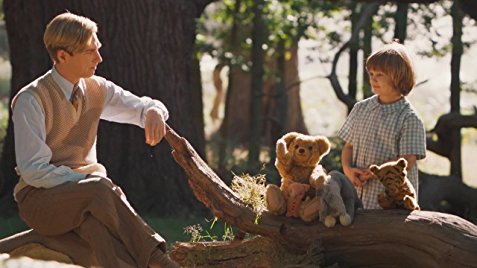
I was never a Winnie The Pooh fan. The books weren’t part of my childhood, and when I read one to my daughter, neither of us was particularly enchanted by it. Rather than hearing about an English boy and his stuffed-animals-come-to-life, she preferred that we make up our own stories, which let her creativity flow. After all, that’s what A.A. Milne did with his son, Christopher Robin. The difference is that he turned those stories into books that made Winnie The Pooh a global sensation for several generations.
“Goodbye Christopher Robin” is the origin story of Winnie The Pooh, starting with Milne returning from World War I with what we now call post-traumatic stress disorder. A balloon pop, a light flashing, or any loud disturbance gives him flashbacks to being on the front lines of The War To End All Wars. He comes home determined to write an essay about the necessity of ending armed conflict, but never gets to it because he’s too busy leading the life of a rich London socialite with his wife, Daphne.
Before long, they have a child who they name Christopher Robin but call Billy Moon, and they are not up to the tasking of raising him. Their upper crust snooty ways just can’t include anything so intrusive as spending time with their child, so when they move out to the country so Milne can have some peace and quiet, they hire a nanny named Olive, who Billy spends almost all of his time with. It’s not until Daphne leaves to return to her party life in London and Olive has to go off and spend time with her ailing mother that Milne is left alone with Billy and forced to bond with him.
It is their walks through the nearby woods with some of Billy’s stuffed animals that lead to the plots of the Winnie The Pooh stories about a bear, a donkey, a tiger, a pig, a couple of kangaroos, and a boy named Christopher Robin. When Milne gets those stories published as a book, it becomes a worldwide sensation, but now Billy is being used as a marketing tool, forced to pose for pictures, attend other people’s parties, and be the character instead of the little boy he really is. That’s where the story turns inward on itself, and as Billy grows up, he resents the fame even more.
The best part of “Goodbye Christopher Robin” is Alex Lawther, the boy who plays the title role. He’s cute, has amazing dimples, and delivers his lines with just the right tone every time. Domhnall Gleeson is fine playing A.A. Milne as a stiff upper lip Brit, while Margot Robbie chews the scenery every time she’s on screen as his spoiled socialite wife, Daphne. Only Kelly Macdonald shows any real compassion and composure as Olive, the nanny.
I won’t give away what happens in the last act of the movie, but I will say that it manipulates the viewer in a way that made me uncomfortable. That, plus the entitled nature of the British upper-class, turned me off. Though the movie is rated PG, the recurring war themes and indifference to the boy’s issues do not make this the family outing the producers no doubt hoped it would be. If you want to show your kids a Winnie The Pooh movie, stick to the animated Disney stuff.
I give “Goodbye Christopher Robin” a 4 on a scale of 10.
